How will Covid-19 transform public services?
Interviews with local leaders from our report Seizing the moment: building local bridges to the future.
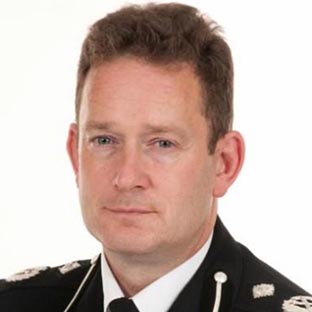
BJ Harrington
Chief Constable, Essex
Do you think the Covid-19 crisis will lead to fundamental changes in the way public services operate?
The crisis has accelerated and brought forward a number of things that would have seemed impossible six months ago. Some have been imperfect, a bit ragged around the edges. A good example both nationally and locally is the court service where the use of video enabled justice was going to be a three year programme and instead it’s happened almost instantaneously. We need to build on these advances.
We have forged much better working relationships between the local council chief executives, health leaders and ourselves in the crisis. It’s brought people round the table more, and made them more willing to talk about things in order to achieve some outcomes. That will help us in the future.
Our Essex Centre for Data Analytics is already providing evidence around the education challenges for young people, and about neglect. And some of the mechanisms we put in place in the crisis around shared data and analytics will provide a much more robust evidence base to affect change.
There is also lots of tactical stuff such as greater joining up around the shared responsibilities around roads. And sadly Covid-19 brought a renewed focus on the county’s death management systems. There is a greater willingness for people to work together around those kind of things.
We need to understand we are in a new paradigm. We can’t go back to where we were. That is the single biggest thing that we have got to recognise. We have got to make sure the new normal, the way we work, will be different.
The danger is that we revert back to what we had before, because it’s familiar. But equally we can’t keep operating in an emergency mode. There is a balance there, but you can’t reset it completely. We need to capitalise on the opportunities.
And that will be different for different organisations. Everyone is talking about recovery — but we have never stopped our service. That’s the nature of our business. We have changed how we deliver it. We have adapted and we have many more people in support roles working at home. But we haven’t stopped the service.
What challenges might prevent you from using this opportunity to improve public services?
Covid forced everyone to take decisions quickly. Some people may want to return to slow and sometimes cumbersome decision making processes.
Lack of money or new costs associated with working with Covid may be an issue: we may have to make reductions to some services to prioritise others.
And the way we have been working in the crisis has been uncomfortable for a lot of people. They may want to try to go back to where it was comfortable.
Equally we must not seek to do everything in crisis mode and must recognise when to slow down and take our time.
What are the most important things for you do do as public sector leaders to make the most of the opportunity to improve local public services?
We need to keep the relationships and the frank dialogue —including being willing to challenge each other. It has never been a problem in Essex but that’s important.
And we need to be quite brave about being willing to change what we do in our own organisations, as well as how we link across and influence each other, and hold each other to account.
We need to keep the dialogue so if staff see at the top of organisations, leaders making compromises, reaching agreements, moving forward, that empowers, enables, allows those below to do the same things. We have got to reach into our organisations and make the changes happen.
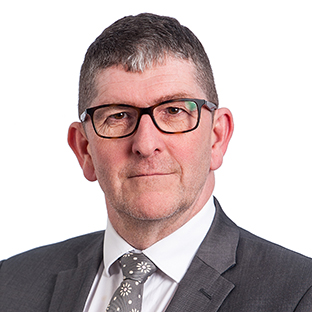
Niall Bolger
Chief Executive, Hounslow Council
To what extent to you think there will be fundamental changes in the way public services operate in Hounslow as a result of the Covid-19 crisis?
It’s likely to be quite profound. We are rethinking public services across boundaries. It’s really rebooted our ambition. We could easily be in the tactical, but we are in the strategic.
We started our borough recovery work in June. We established a multi agency partnership with five task forces and multi agency boards.
And it’s likely to go beyond the public services. Our recovery work has engaged and involved the business community, the voluntary and community sector, as well as development interests, sports and leisure.
We had a borough conference on recovery in September attended by more that 220 people. We had Heathrow Airport, we had major developers, community representatives, people from the Greater London Assembly, the Centre for London, think tanks, and so on. Doing work together in a very innovative and creative way, in really quick order. And coming up with meaningful, deliverable, realistic and ambitious programmes for change.
And across West London we are building recovery plans. We have been very careful about creating policy based on evidence and lived experience.
Covid-19 has also caused us to completely rethink our community engagement involvement, completely reconfigure the way we engage with vulnerable people, really look at our digital offer. We are integrating our services around a model called community solutions which is really rethinking public services within neighbourhoods. We are virtually and physically repurposing some of our activity within communities.
And we have released our workforce to do good. The crisis has been a call to arms for people to stretch. You have seen the public service ethos in spades. People going mile after mile before in the service of very vulnerable people. It has been extraordinary a call to arms.
We have completely refreshed our value framework, we have re-looked at our organisational development strategy, we are reshaping our offer in communities.
We wouldn’t be able to do that in peace time. Things that could take years are taking days. I suspect that is not going to be sustainable in the longer term. The way of working might be but not in terms of individuals.
In three years time what will have changed?
The agreed community solutions model would be embedded, and we would have tested it out, engaging and involving our community.
We would have a green enterprise zone which is working with all of those enterprises and public services and universities to reframe a part of our economy which has become very vulnerable. We are trying to diversify our economy looking at sunrise industries, rather than sunset ones based on carbon.
We want far more integration with our public sector partners. We are turbo charging that work.
We want to achieve a different settlement with our colleagues in the health service. There is no question that integration needs to be further, deeper and faster.
And we are going to review our constitution. In the first wave, members weren’t in committee meetings, they were in food banks, they were in schools, they were reaching out, understanding their communities, building interlinkages between public services and mosques and churches. They were genuine community leaders.
What key challenges might constrain these ambitions?
I don’t think there are massive challenges.
The government and the things they aren’t doing is an opportunity to give clarity, direction, localist approaches to what the solutions are. Part of the reason why we have to crack on is they don’t know what to do.
We are fortunate in our financial situation compared to other boroughs and places but money is an issue for many councils. There is a £1.6 billion funding gap across London. But we shouldn’t ask the government to fill the money hole without solutions.
And the workforce are tired but they are exhilarated.
What leadership will be needed to take this forward?
Across public services we will need to reflect on the fact that leadership is going to be found in unexpected places and we have to be comfortable that it does. I’m not going to be putting people who can do brilliant things back in a box. We want to liberate them further.
Equally it demands that we are really clear what is the core of our tightness, what is the core of our compliance. What is the discipline, and what is the looseness, what is the stuff that just can’t work within that framework?
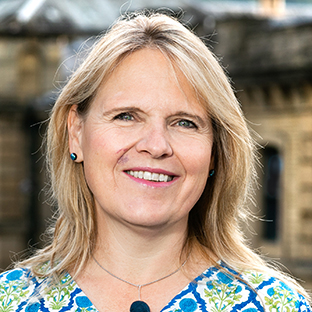
Kersten England
Chief Executive, Bradford Council
What happened in the first wave of the crisis in Bradford?
Bradford is home to over 530,000 people, it’s the UK’s youngest city and over 150 different languages are spoken here. That size, youth and diversity presented a complex set of challenges. Our response was rooted in our deep connections to our communities and strong mature partnerships built up over many years.
A vibrant voluntary and community sector is one of the District’s principal assets and organisations such as the council, health services, police, our university and teaching hospitals work closely alongside it to deliver what is often ground-breaking work. ‘Born in Bradford’ for example, is a health led partnership undertaking globally important research into childhood.
When the first wave of Covid hit these strong networks enabled us to ensure a swift and coordinated response meeting the differing needs of our diverse people and places. Within a week we established five locality based hubs linked to 50 community sites. Collaboration across sectors was key in each of these places.
We were able to mobilise significant private sector resources. Morrison’s, which has its HQ here, helped with food supplies as did a myriad of smaller suppliers, our main retail centre provided storage facilities, our manufacturers produced equipment and PPE. The council partnered with wholesaler Deli Fresh on an award winning initiative putting fruit and veg on tables.
We created our own testing facility because we were struggling to get tests for care home workers and residents. We bought PPE costing £10 million for use across the region.
A ‘Covid Scientific Advisory Group’, brought together clinicians, academics and practitioners. They have systematically, quantitively and qualitatively, examined the impact of the virus. So we have been a step ahead of the government in understanding local vulnerabilities.
Covid has a disproportionate impact on many people here and we knew that poorer communities, large multi-generational families living in close proximity and people with obesity and diabetes would be at risk. So before lockdown was announced we were out on the streets working to raise awareness about how to stay safe and where to get help. We had fewer first wave deaths in the Muslim community than in comparable areas. I’d like to think that what we did in those early days was a contributory factor.
Collectively we shared the disappointment as Eid was effectively cancelled and worked with the Council for Mosques to ensure that people were able to celebrate as best they could. The response from all of our communities has been frankly magnificent with people going the extra mile for each other time and again and with countless acts of kindness, care and humanity.
That we have responded rapidly and effectively should not surprise us. For several years we have cultivated a #teambradford mentality that cuts through the sectoral boundaries. We are all of and committed to this place and bring different things to it. What drives us is a sense of responsibility and willingness to think about what will achieve the outcome, not just waiting to be told what to do. The pandemic has strengthened the unity of our approach creating conversations about need and support that you don’t always get.
How might the cross sector collaboration develop in the future?
The crisis has accelerated progress on some of the things that we hadn’t been working on with as much urgency or effectiveness as we might.
For example, people recognised a need to focus on locality working in order to achieve the best outcomes for our communities. But activity was fragmented with a lack of connection in our architecture, business process and governance. Covid acted as a catalyst to build activity around natural communities. In future this approach will be at the heart of urban regeneration and our delivery of early help; expanding our network of “community anchors”, involving volunteers, training, supporting small business, delivering preventative services and providing pathways for people to access opportunities and to connect.
We know more about each other now, about what we can achieve together and about our collective asset base. This can only strengthen the relationships, trust and confidence needed for effective collaboration. I would anticipate a refreshed approach to the sharing of data, intelligence and insight across organisational boundaries that will broaden our collective understanding of place and the interventions needed to help it prosper.
What might get in the way of more cross public sector collaboration?
There is so much uncertainty. The impact of the second wave, flu, winter weather, Brexit — if we crash out. A crashing economy.
We need certainty from government in terms of overall funding and we need to be trusted as local leaders with flexibility as to how resources are used; if we default to inflexible, centrally imposed approaches this will inhibit innovation and collaboration.
And we have been working solidly since March, seven days a week without a holiday. We are exhausted and there are no ‘fresh legs’ to bring in to replace us.
As leaders how will you take this forward?
We have stories we can now tell about the amazing things that have been done and that’s a really important part of our ability to continue.
We need to reframe and to systemise the connections. We must enable that with governance, processes, data sharing, bureaucratic things. If you put them up front they get in the way, but long–term you need them.
I feel that I am back to the future, redesigning a local strategic partnership with a renewed esprit de corps and willingness to work beyond confines of institutions.
What does the government need to do to support you?
The crisis is revealing systemic factors, and the lack of coherent policy or strategic approach by government to address these. We have got multiple things happening that are not connected to strategic analysis, interdepartmental working and long term thinking.
I always subscribe to ‘well we will just get on and do everything that we can possibly do’. But this is a national moment demanding a proper national conversation. What are we as a nation? What are our responsibilities? How do we discharge them? What does that mean for governance, resources and priorities?
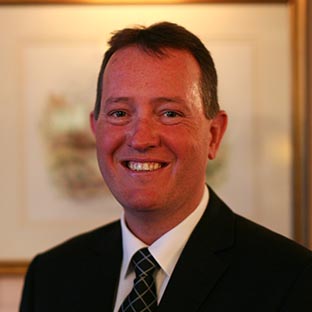
Paul Matthews
Chief Executive, Monmouthshire County Council
How has the pandemic affected the way you work with other public services?
We have had a relational leadership agenda with our key public sector partners for almost a decade. We try and spend time together. It builds trust.
Covid-19 tested that, but it hasn’t required us to build something entirely fresh. We have not had to compromise our purpose, our values or our design principles but everything else has been up for grabs as we have built coherent strategy and delivery to get us through.
In dealing with the crisis we have been prepared to take very local decisions. Councillors have shown huge trust in officers and that has been reciprocated. We have tried to stay smaller than the problem at all times and get alongside our communities in a shared endeavour. We had and have the confidence to do what we feel to be right, rather than what others feet to be right, because we have the support of our partners. The trusting relationships we have with the police and health and others made it so much easier.
We felt that we absolutely had the space and the legitimacy required to take the action we needed to take. All of a sudden we were able to lay down challenges like: ‘Can we agree this today please?’ That’s the way we have been operating.
March 2020 seems a long time ago already and it’s important to remind ourselves how anxious and fearful people were back then. That apprehension was shared by public servants but there was no thought given to taking a backward step. My 4,000 colleagues have risen to the challenge of their time. They have embraced the trust and the freedom placed with them. They’ve been prepared to carry the responsibility that goes with that and I have no intention of closing that down.
I think our organisation has been more effective over the course of the last six months than at any point in my tenure. And that can grow.
What would you like to achieve with other public services over the next few years?
We need to get even better at creating pictures of tomorrow together. I’d love the leadership cadre across agencies to have an even deeper shared narrative — the story of Monmouthshire— if we were on different stages in different countries across the world at exactly the same time talking about our place, the words may be different but the clarity of message would be absolute. If we are selling a place, promoting a place, cherishing a place, I think this alignment matters.
I think the relational agenda that we rely on needs to be worked on further and go deeper and deeper into our organisations. I foresee the day for example when the Chief Constable will be taking part regularly in our staff induction processes and the Leader of the Council will be reciprocating.
There is room to be building and sharing more data and evidence together. As an example, the Chief Fire Officer of South Wales Fire and Rescue Service and I are currently working on a common data portal to support cross-agency work on vulnerability. It sounds pretty bland I know but at 3AM in the morning when you are about to lose a town to flooding as we were earlier this year you really don’t want to be scrabbling around for data.
What key challenges do you face in working more collaboratively across public services?
I fear losing sight of what really matters: we have proven to each other in high stakes environments that we can achieve anything if we have clarity on what we are fighting for. We should be holding on to this dynamic.
And fatigue: public servants have been full on, and are tired. We have to reenergise. The human being has yet to be born that can operate at the edge of their competence and capability every single day. We are in this for the long haul and our people will not thrive on repeated doses of adrenalin alone. If we want sustainable exceptional performance then we have to find a perfect equilibrium of high challenge and high support. If these are out of balance we will not achieve our very best outcomes.
I worry about a re-emergence of hierarchy which is often (not always) a brake on progress. It’s been a joy to be able to do anything, to act in the moment. In government circles things are already slowing down, returning to normal. Things that would take five minutes are now taking five days, sometimes two weeks. Time is a design consideration that doesn’t receive the attention it deserves. I would rather be 90% there and good to go in a week than 100% perfect and ready to launch in a month. Iteration through normative learning is a pretty powerful thing.
What will you stop doing?
Organisations like mine will not be waiting for permission to do things. Local government’s confidence should be really high now. We have demonstrated once more that in the hardest times we come up trumps. We have great people, we know our place and we are emotionally invested for the long term. At our best we are a trusted local brand that citizens can readily identify with. More of us need to be getting to this place.
I think local government is about to become much more demanding for more delegation of powers and resources. So that it is not so much what we are going to stop doing but it is a different set of expectations which will be challenging for many who hark back to times pre-Covid. Those times are gone, we have moved on.
And a lot will change through digital exploitation. We will see dramatic changes in the ways we decide how we are going to provide a service and where we are going to provide a service. Instead of focusing on what we are going to stop doing we need to focus on how we use our people and resources as effectively as possible.
As local leaders what do you need do to achieve more collaboratively?
It is about leadership rather than leaders. Leadership involves thousands.
We have seen real leadership within and around communities and this needs to be cultivated. The core of the Monmouthshire response has not been about public agencies, it’s been about enabling the 60 or so voluntary Covid groups that were there before we asked them to form.
We didn’t say this is what we want you to do for us. Instead we asked “How can we help you to do what you want to do for your communities?” We took an enabling, facilitative approach.
We have seen the emergence of a whole new cadre of non-paid genuine community leaders. 1,300 active volunteers. And my goal over the next 12 months is to make sure they are still there, they are still doing things.
This opens up fresh conversations about citizenry, participative democracy and power of the soft and hard varieties. I think we will be going local in an even bigger way and looking to work with our residents on the futures they want for their families, friends and places.
That’s big if not the biggest leadership challenge. How do we create the conditions which continue to encourage people to engage through passion rather than remuneration? How do we continue to reinvigorate the DNAs of villages, hamlets, towns? I want to turn on 100,000 people — the population of Monmouthshire — rather than just the 4,000 who work for the council.
Final comments?
Clear purpose, aligned values and a vocational calling form a really powerful trinity. The events of 2020 have seen us at our best. The goal is to hold all of the gains, add to them and keep moving forward together.
There has been real human tragedy to confront and we would not want to add to that by returning to a place that we have outgrown together.
I am hugely optimistic for the future; what a time to be in public service.
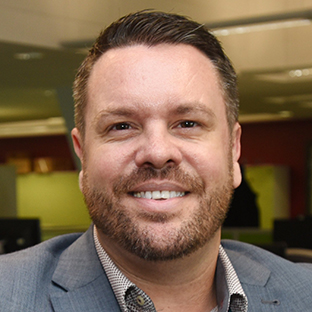
Professor Craig Harris
Managing Director, Wigan Clinical Commissioning Group
Given the Covid-19 crisis and all its repercussions, are you still likely to achieve all your transformation ambitions in Wigan?
The crisis means we need to change course but doesn’t mean our ambition is any less.
We want to continue the transformation agenda. Covid is the new weather. We need to move from restoration to recovery then beyond.
We will need a couple of course corrections to get us back to where we need to be. We will ramp up some of our programmes connecting with community welfare and citizen engagement.
Before we were quite restricted by organisational boundaries, and the history of how health was created. Covid has almost blown that away, allowed us to rewrite, refocus and reprioritise on what Wigan needs.
We’ve put our foot on the accelerator with stuff that we were already doing. It’s afforded us a springboard to do what we want and need to do in the future.
The crisis has also highlighted a larger inequality gap. It’s pushed us to work harder on inclusivity at scale and pace. No more navel gazing, we need to really drive the equality agenda home.
What do you hope to achieve, working with other public services?
Our integrated commissioning is working well. We are making sure health and social care is seamless. Team Wigan is the way forward, less duplication, a more responsive preventative offer and spending the Wigan pound wisely.
The crisis has driven us to think about contributing to community wealth building as well as turbo charging integration.
That changes the whole public service offer. It changes our relationship with residents, and the communities and voluntary organisations that have been at the heart of the resilience in the last three months.
We are now seeing our workforce as a solution, not just an enabler. So how do we create opportunities for local children and young people? How we get the best out of everybody in relation to employment?
And how do we commission and procure things? How can we use local firms more to strengthen the local business sector?
In three years we will measure our success not only by did we increase our local supply by X amount, but by how much did we keep the Wigan pound in Wigan, how much did we increased local opportunities.
What major challenges do you face?
The new lockdown and addressing the months of NHS backlog mean there is less capacity. And money is an issue: the NHS and social care were £20 billion underfunded before Covid.
What must local leaders do to achieve cross public sector transformation?
People need to think people and place and not services. That almost feels old language in Wigan because we have been working together on ‘The Wigan Deal 2030’ for some time.
Don’t just talk the system talk, walk the system walk. You really need to be working in collaboration, in partnership, sharing your assets. We meet regularly, building back better together. And you need to challenge people who say ‘things are done this way because they have always been done this way’.
There is no handbook for this now. You are rewriting history as you go. There has got to be a degree of flexibility in the approach: thinking outside of the box, rather than ticking the box.